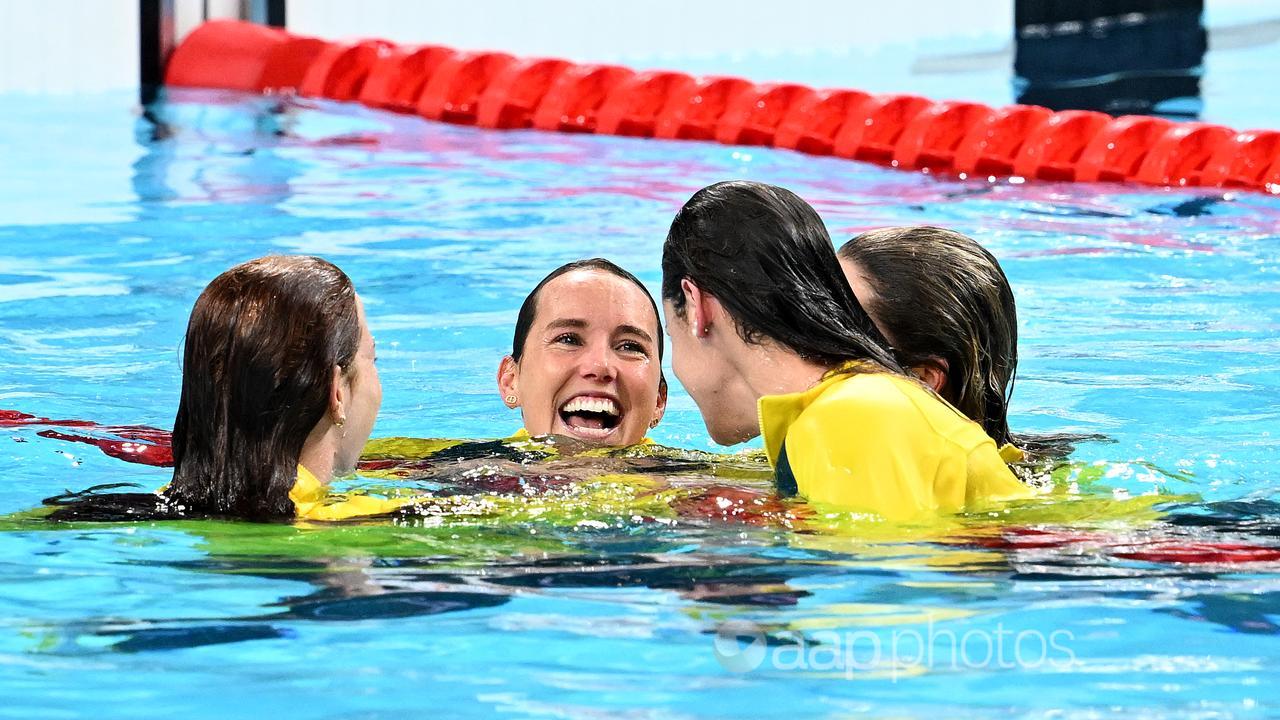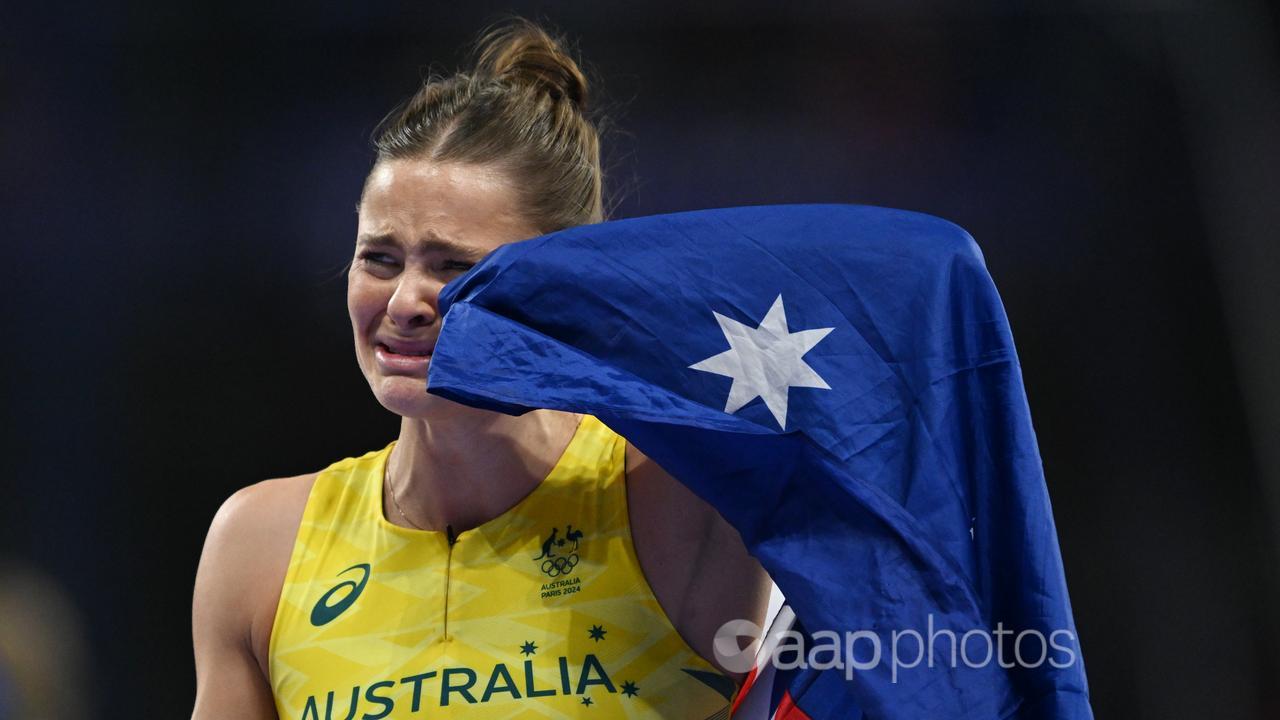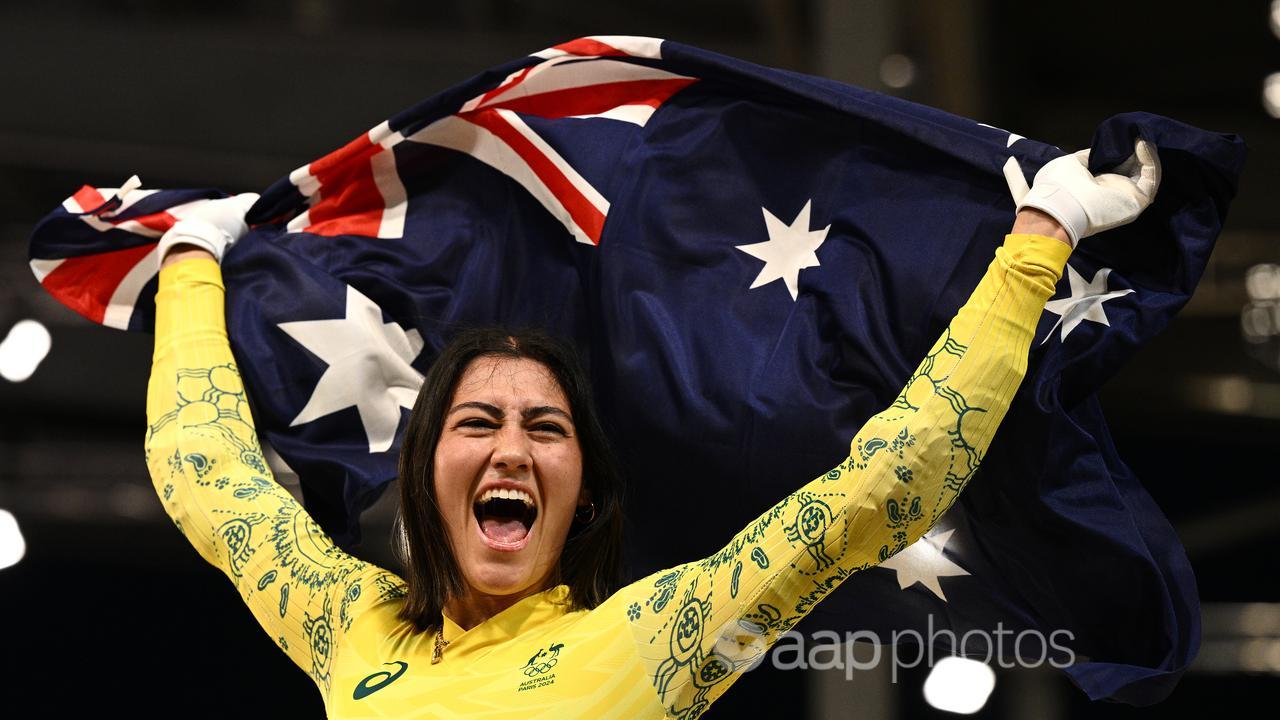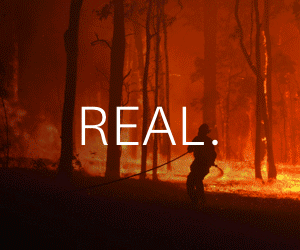Australia’s Olympic boss is savouring a French feast of record proportions.
But chef de mission Anna Meares warns similar sweet success isn’t guaranteed in the future.
The Paris Olympics is Australia’s most successful Games in the 128-year history of the sporting showpiece.
Australia’s reputation as a sporting powerhouse, proverbially punching above its weight, is confirmed.
The nation finished fourth on the medal table with 18 gold medals, 19 silver and 16 bronze.
The 18 glittering golds eclipse Australia’s previous best hauls of 17 from the 2004 Athens Games and in Tokyo three years ago.
The overall Paris collection of 53 medals is a record for an away Games and only bettered by home-ground feats in Sydney 2000 of 58 medals.
Australia captured medals in 14 sports in the French capital.
Five Australians – sailor Matt Wearn, paddler Jessica Fox, skateboarder Keegan Palmer and swimmers Kaylee McKeown (twice) and Ariarne Titmus – defended their Olympic crowns.
Swimmer Mollie O’Callaghan was the nation’s most successful athlete with three gold medals, plus a silver and a bronze.
Swimmers McKeown, Titmus and Shayna Jack – whose dreamy feats followed a two-year nightmare of a doping ban – and peerless paddler Fox depart Paris as double gold medallists.
Australia’s decorated Dolphin Emma McKeon bolstered her unrivalled medal collection: the swim ace retires with six golds and 14 medals overall, both national high-water marks.

Australia’s team of 467 athletes included skateboarder Arisa Trew: she won the woman’s park event, aged 14 years and 86 days, to become the nation’s youngest-ever Olympic gold medallist.
The staggering success came at a cost: $25 million to be precise.
And Meares cautions unless that funding can, at the least, be maintained there may be leaner times ahead in 2028 in Los Angeles before Australia is an Olympic host for a third time, in 2032 in Brisbane.
“This campaign has cost something in the order of $25 million,” Meares said.
“Take time to celebrate it … this is a great achievement.
“It obviously lends to a greater expectation going forward.
“We know that a Games leading into a home Games for Brisbane is really critical.
“What I have really enjoyed here is the breadth of sports that have had success.
“The support that we need, the funding for the sports, is critical in the next eight-year cycle.
“But there’s no guarantee.”
Australia’s achievements were energised by a golden – and silver and bronze – age of women athletes.

Some 57 Australian females have a Paris Olympic medal, as an individual or part of a team, in their carry-away luggage.
“The simple visibility of women in sport is making an impact and we’re seeing that impact,” said Meares, a four-time Olympic cyclist and mother of two – four-year-old Evelyn and two-year-old Bill.
“My daughter has asked me: ‘Mum, can I play this sport?’. And how nice as a parent that I can sit there and say, ‘Yeah baby, you can’.
“That hasn’t always been the case for women coming through in the decades previous and the years previous.
“As a female athlete and a woman, we know what it’s like to feel excluded … it’s undeniable our women have been exceptional at these Games.”
Meares also lauded the deeds of the dudes: 32 Australian males won medals, as individuals or in a team, in Paris.

And she hailed the wisdom of Australia’s coaches, rating them world-best.
Which leads to another worry: how does Australia retain its coaching core in the home-land as other cashed-up nations come knocking?
In Paris, a smattering of Aussies coached rivals, including the legendary Dennis Cotterell (swimming, China), Alyson Annan and Ric Charlesworth (both hockey, China), Gary Sutton (cycling, USA) and Cameron Meyer (cycling, Great Britain).
“It’s one thing to have talent. And we have some incredibly talented athletes,” Meares said.
“Then you need to be able to support the staff around them. We need the good coaches, we need the good support staff.
“And often we can lose them to opportunities with other countries where they are offered better pay, better conditions.
“So we need to look after the staff who support the athletes … it’s not just providing infrastructure, it’s not just funding the athletes and sports.
“It’s ensuring we keep our Aussie coaches, we keep our Aussie staff, that really the world are looking to because we’re able to execute pretty amazingly.”
Australia’s campaign, and for Meares at her first Games as chef de mission, wasn’t always smooth.
There were early teething transport problems with Australian athletes sitting on floors of over-crowded athlete buses.
An assistant coach of Australia’s swim team, Michael Palfrey, was lucky not to be sent home after barracking for Korean swimmers in an interview with Korean media.
Men’s hockey player Tom Craig was arrested for attempting to buy cocaine on a Paris street. The Kookaburra spent a night in custody before being released without charge.
Nineteen Australian Olympians tested positive to COVID during the Games – some competed anyway.
The flashpoints failed to take any gloss of Australia’s golden Games.
“I knew if Paris could pull this off, it was going to be postcard type stuff, it was going to be a spectacular Games – and hasn’t it been a spectacular Games,” Meares said.




















